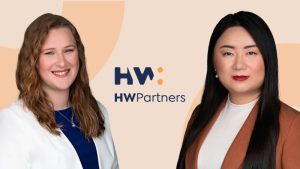Ottawa-based consulting firm The Positivist Group is launching a pilot program to help businesses make their stores more comfortable and accessible for people with disabilities.
The Trained to Help Project features a digital platform that will provide e-learning for employees, while also allowing businesses to publicly share accessibility information with potential customers, according to the project’s co-founder, Sarah Allison.
It can be hard for people with disabilities to know what to expect when they visit a new business for the first time, said Allison.
(Sponsored)

A commitment to mentoring and development creates the next generation of firm leaders
HW Partners (Formerly Hendry Warren LLP) is excited to announce the appointment of Celine Fu, CPA, CA, and Robin Lawrence, CPA, CA, to the firm’s partnership. The Partners are proud

Desjardins Elevator Pitch Competition drives entrepreneurial energy at uOttawa
In uOttawa’s Desjardins Elevator Pitch Competition, a single team member stands before the judges, pitching for three minutes, fielding questions for five. There are no decks, notes, props or prototypes
“My partner suffers from MS and we are always having to do research every time we go somewhere,” she said. “We’ve been talking about how amazing it would be if we had a one-stop-shop … where businesses can put in the door width or if they have an accessible or ambulatory bathroom. Those kinds of details all in one spot.”
In 2022, the World Health Organization estimated that more than 1.3 billion people – about 15-20 per cent of the global population – currently experience disability. Together with friends and family, this group has a spending power of US$13 trillion. According to the WHO’s Return on Disability Report, only four per cent of businesses are focused on making offerings inclusive of disabled people. The International Labour Organisation estimates that the cost of disability exclusion can be up to seven per cent of OECD countries’ gross domestic product (GDP).
At The Positivist Group, Allison said the goal for the platform is to feature businesses around the Ottawa region that people interact with every day, such as retail stores and restaurants.
The project soft-launched in March, with plans for an official pilot to run from August to September this year. Several businesses have already signed on for the early stages of the project and Allison said she’s looking to hear from others wishing to take part in the pilot, as well as the research stage.
The e-learning component provides training modules for business owners and their employees on complying with the Accessibility for Ontarians with Disabilities Act (AODA). It also includes feedback from surveys The Positivist Group conducted with people with disabilities on their needs and how businesses can meet them.
“The e-learning training is about how to interact with individuals,” Allison said. “For example, (it tells employees) to speak to the person in the wheelchair, not their caregiver. Simple things that are not always so simple. There’s often an oversight when it comes to individuals with disabilities, so we want to ensure they’re trained to speak with people with dignity and offer help and transparency.”
Businesses who complete the training will receive a certificate and other materials to display online and in-store. They’ll also be included in the platform’s searchable database.
While Allison said businesses should still make accessibility information — ramps, stairs, door widths — available on their websites, the online platform will offer another way to make those details readily available to customers.
In Ottawa and the surrounding area, that information is especially important for disabled customers.
“There’s a lot of old infrastructure in small towns and even in downtown Ottawa,” she said. “A lot of infrastructure just can’t be brought up to code. But when you have the knowledge to make that choice, it opens up a whole different world.”
Allison said working toward accessibility isn’t simply about forcing businesses to comply with regulations.
“It really goes back to providing everyone a sense of knowing that they’re building a more inclusive environment,” she said. “Everyone talks about ‘normalizing,’ but when you’re actually doing it, you end up feeling better.”
She added, “There’s always loopholes in all these regulations. But when you go above and beyond, you’re doing it for the right reasons and it’s noticeable. You’re more inclusive and you create more of a community. And that has a ripple effect. And when you have a wonderful experience, you go back and tell your friends.”





